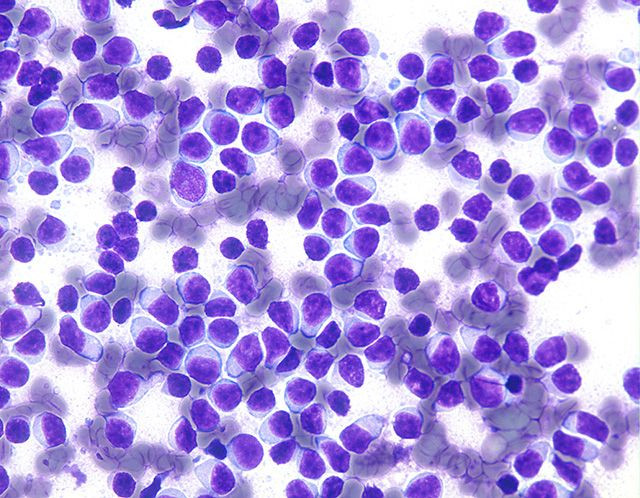Chronic Lymphocytic Leukemia Drug, Obinutuzumab, From Genentech Now Under FDA Priority Review

Roche, the Swiss juggernaut pharmaceutical company that owns Genentech, announced that it has submitted its new leukemia drug, obinutuzumab, to the U.S. Food and Drug Administration under Priority Review status. The drug is a monoclonal antibody treatment aimed at treating chronic lymphocytic leukemia (CLL) by targeting a receptor that sits on the surface of the cancerous cells. The antibody has been specially engineered to not only call other immune cells to attack the cancerous cells but to also initiate a suicide signal in the targeted cells.
"We're excited that the FDA has granted GA101 in CLL both Breakthrough Therapy Designation and Priority Review," said Hal Barron, M.D., chief medical officer and head of Global Product Development, in a press release. "These FDA designations acknowledge the promising trial results with GA101 and will hopefully allow this novel medicine to reach the people who need it in an expedited time frame."
CLL is one of the most common forms of blood cancer, and it is expected that there will be 5,000 new cases of the disease in the U.S. diagnosed this year. The cancer results from abnormal growth of B-cells, the antibody-producing immune cells that usually help to fight off infections. Most people affected by the disease are over the age of 50 (over 75 percent) and are disproportionality male. There are two forms of the disease, one that is more aggressive and requires treatment, with a pre-treatment survival expectation of eight years, and a less harmful form that gives a 25-year survival without treatment.
The new drug is an antibody that specifically targets the CD20 surface receptor, which is overexpressed on CLL affected cells. Scientists have added carbohydrates to the constant, non-changing area of the antibody in order to make it more reactive with scavenger immune cells, which become activated when they sense antibodies attacked a target. This causes a response called antibody-dependent cellular cytotoxicity (ADCC), in which immune cells are signaled to kill their target. The drug also can directly tell the CLL cell it binds to commit suicide in a process called apoptosis. Apoptosis is a common occurrence and happens, for example, when a fetus is developing and the tail, gills, and finger/toe webbing cells all die, leaving the baby to be born without these features.
Late stage Phase III clinical trials showed that the drug reduced the chance of the disease worsening or of a patient dying by 86 percent. The drug was effective in combination with chlorambucil, while chlorambucil by itself was ineffective. Chlorambucil, also called Leukeran, is a chemotherapeutic agent used for CLL treatment and works by attacking DNA and preventing DNA replication when cells divide. The new drug is also being investigated in clinical trials compared with rituximab in non-Hodgkin's lymphoma (NHL) and diffuse large B-cell lymphoma (DLBCL). Rituximab is another, older version of the CD20 antibody and is used in various B-cell related lymphomas.
If all goes well, the drug could be approved by the FDA around the beginning of 2014.
Currently, there are seven ongoing clinical trials using this drug. They can be found on the National Cancer Institute's website here.
Published by Medicaldaily.com



























